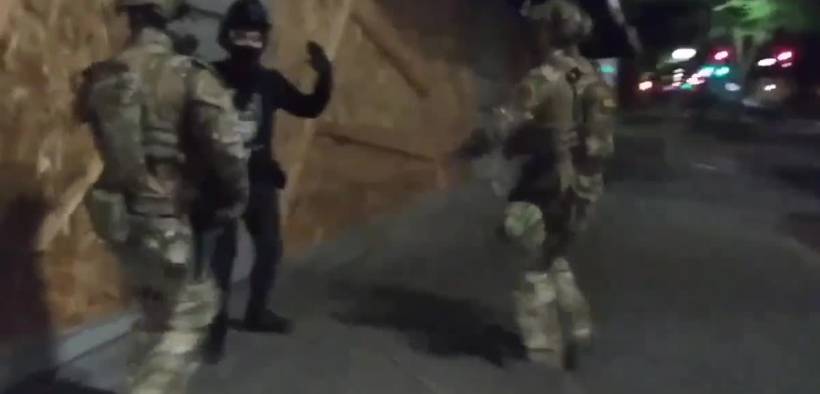Democratic Leaders Scramble to Respond to Trump Sending in Federal Agents

Democrats in Chicago, Kansas City, and Albuquerque have struggled to respond to Trump sending in federal agents.
On Wednesday, President Donald Trump offered some details on Operation Legend, a federal law enforcement operation in Chicago, Kansas City, and Albuquerque to combat crime. The announcement sent local Democratic leaders into a scramble, Quinton Lucas, the mayor of Kansas City, said he found out about the operation on social media.
The announcement of more federal police on the ground as protests continue against police brutality was not exactly a surprise.
Several days before the announcement, Trump said of unrest in American cities, “New York and Chicago and Philadelphia, Detroit and Baltimore and all of these – Oakland is a mess. We’re not going to let this happen in our country. All run by liberal Democrats. New York and Chicago and Philadelphia, Detroit and Baltimore and all of these – Oakland is a mess. We’re not going to let this happen in our country. All run by liberal Democrats.”
Operation Legend is controversial and politically charged after images and video in Portland showed unidentified officers arresting civilians and whisking them away in unmarked cars. Customs and Border Patrol and other federal police are still on the streets of Portland, and clashes between federal police and protesters have increased in recent days.
As unrest mounts in Portland, local Democratic leaders in Chicago, Albuquerque, Kansas City, and other cities that may potentially see an increase in federal police have struggled to forcefully respond to Trump’s power move.
Chicago
Chicago is the focal point of the operation and violent gun crime in the city has been a recurrent theme in Trump’s messaging. Operation Legend will send around 200 federal law enforcement agents into the city to combat violent crime, but many have called into question how effective they will be in this effort considering the city has over 13,000 police officers.
Chicago Mayor Lori Lightfoot’s original message was “under no circumstances will I allow Donald Trump’s troops to come to Chicago and terrorize our residents.”
But after a phone call with President Trump, Lightfoot agreed to allow the federal agents into the city and said, “I think we (Lightfoot and Trump) understand each other, and I’ve drawn a very, very sharp line.”
The White House has outlined Operation Legend as different than the federal agent operation in Portland, one focused on solving local crime rather than suppressing protests. But Democratic leaders have expressed their suspicions.
Illinois Governor J.B. Pritzker said, “it’s this other thing that’s going on where people are wearing camouflage uniforms with no identification about who they are, claiming to be protecting federal buildings … that is not something that is acceptable in the state of Illinois or city of Chicago.”
Mixed Messaging
Other local Democratic leaders have found themselves similarly warning that federal agents are not welcome while still allowing the latest operation to continue unimpeded.
Albuquerque Mayor Tim Keller told NPR, “I mean, we always welcome actual crime-fighting partnership… I think we’re really worried about more of a bait and switch.”
In his term as mayor, Keller has increased the police budget and repeatedly called for the police department’s need for more officers and resources.
Governors and mayors across the country have also preemptively responded about the potential of federal police being sent into major cities as part of Operation Legend.
Democratic Colorado Governor Jared Polis has not asked for more federal law enforcement, but in a press conference yesterday he said, “if we need them, I won’t hesitate to call upon President Trump, to call upon federal support.”
Some Democrats have offered a more forceful message such as New York City Mayor Bill DeBlasio, who said he would sue the President if he sent federal troops into the city.
But, the varied responses from local Democratic leaders show the predicament President Trump has placed local governments in, one in which they haven’t always appeared unified and coherent.







